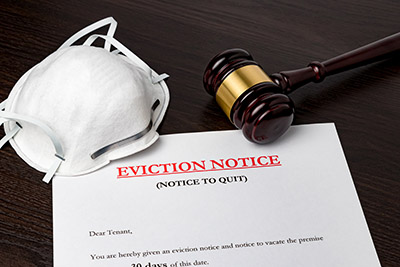Finding Your Path
The Eviction Moratorium Must End
By Lorne Polger, Senior Managing Director

It hardly seems like 18 months ago when the Covid-19 pandemic shut down business as we knew it. In some respects, I remember March 2020 like it was yesterday. We continue to live through a unique and at times, surreal, chapter in history.
The U.S. unemployment rate peaked at 14.8% in April 2020, the highest since the Great Depression. The U.S. economy, as measured by real (inflation-adjusted) gross domestic product (GDP), fell by 3.5% (year-over-year) in 2020, the first time that the economy shrank on an annual basis since 2009.
The federal government responded to the crisis when it enacted fiscal stimulus and relief to those affected by the Pandemic. The Federal Reserve also took a series of substantial monetary stimulus measures to complement the fiscal stimulus. Some of the most notable and effective programs included interest rate cuts, the Paycheck Protection Plan (PPP) lending program (with most loans later forgiven), and the Main Street Loan program. Some programs, like the two rounds of stimulus checks, felt more political in nature. Many of these programs were extraordinary in bridging the gap and helping businesses, their owners, and employees to make it through a very challenging time. I’m aware of many circumstances where a PPP loan made the difference between the continuation of a long-term business and its demise. Included among the relief policies was an eviction moratorium, as discussed in detail below.
The CARES Act created a moratorium on evictions that was initially set to expire in July 2020. The moratorium has been extended several times. In June 2021, the government announced it would be extended a final time to the end of July. In August, the Center for Disease Control (CDC) announced a temporary halt on evictions in counties experiencing substantial or high levels of community transmission of Covid. This new mandate – which impacts counties with about 90% of the population – will expire in October, although it is anyone’s guess whether it will be extended again (there is considerable pressure to do so).For renters to avail themselves of the benefits of the moratorium, they need to meet these current conditions:
You don’t expect to make more than $99,000 as an individual, or $198,000 if married, in 2021.
 You must have been laid off, had “extraordinary” out-of-pocket medical expenses (more than 7.5% of adjusted gross income), or had a “substantial” loss of household income.
You must have been laid off, had “extraordinary” out-of-pocket medical expenses (more than 7.5% of adjusted gross income), or had a “substantial” loss of household income.
You need to do everything you can to make “timely” partial payments as close to the rent you owe as “circumstances may permit.”
Eviction would “likely” lead you to either be homeless or to move to a place where you would be crowded closely with other people.
In theory, tenants who meet these conditions must provide a signed declaration to their landlord. The reality though has been rather different than the stated policy. In reality, the court systems in most jurisdictions where Pathfinder owns properties have basically shut off the unlawful detainer process, which removes a landlord’s primary “stick” as to non-paying tenants. So, in practice, there really isn’t a procedural mechanism to evict a tenant who is not paying their rent (whether they have a legitimate reason or not).
This relief program made sense in the spring of 2020. We were in an unparalleled health and economic crisis. There was legitimate concern that we would have a housing crisis perhaps not seen since the Depression absent some safety net to keep people in their residences, notwithstanding their ability to pay their mortgage or rent. But that was then, and this is now.
The economic recovery has been nothing short of amazing across most sectors. Remember that in April 2020, the unemployment rate reached 14.8% – the highest rate since 1948. I would not have predicted then the pace of our economic recovery. In early August, the unemployment rate dropped another 50 basis points to 5.4%. In some parts of the country, the rate is below 3%. The rate in February 2020, just before Covid hit, was 3.5%. But the percentages are not the most meaningful statistic.
As my partner Mitch noted in his article, there are almost an equal number of available jobs today as there are unemployed people. In my conversations with business owners this summer, it is apparent that we are essentially back to full employment, even with the recent surge in cases from the Delta variant. Whether in retail, hospitality, construction or manufacturing, the resonant theme of this summer is that “we have more work than we have people.” Business owners are understandably frustrated right now.
 Why shouldn’t landlords have the same protections as tenants do? Why, at this point, should the federal government take away a legal contractual right? If I’m providing a service (a residence), is it legal, at this point, for the government to say that the beneficiary of the service doesn’t have to pay for it? That is the essence of property rights. Some landlords are now pushing back. Many lawsuits have been filed over the past couple of weeks alleging that this policy now amounts to a “taking” by the government (A taking is when the government seizes private property for public use; typically, the government must compensate the owner for the value of that taking.)
Why shouldn’t landlords have the same protections as tenants do? Why, at this point, should the federal government take away a legal contractual right? If I’m providing a service (a residence), is it legal, at this point, for the government to say that the beneficiary of the service doesn’t have to pay for it? That is the essence of property rights. Some landlords are now pushing back. Many lawsuits have been filed over the past couple of weeks alleging that this policy now amounts to a “taking” by the government (A taking is when the government seizes private property for public use; typically, the government must compensate the owner for the value of that taking.)
Pathfinder’s experience since Covid hit is that most of our tenants have paid their rent (about 96% on average during the month that their rent was due, and then another 2-3% sometime after that). Federal, state, and local safety net programs have helped as well. In fact, the majority of those that didn’t pay their rent since March 2020, have not been because of a job loss due to Covid. Statistics from the National Multifamily Housing Council also bear this out. Their most recent monthly datapoint showed that almost 96% of renters paid their rent (keep in mind that there is always a percentage of tenants who don’t pay their rent, in good times and bad).
So, what is the purpose of extending the moratorium at this point, other than playing politics? Or is it just that indecision from the legislative branch (in the form of allowing for the extension of the moratorium) will lead to a judicial solution? And what precedent are we now setting? It’s okay to not pay your bills? It’s okay to not work when work has become plentiful again?
And as noted in a recent Op-Ed in the Wall Street Journal, what about the longer term? One of the biggest issues facing the apartment industry is a continuing housing shortage across the U.S. How do you fix that? You build more housing. You adopt policies that encourage building. Does the continuation of a once-timely policy more than 18 months after the onset of the pandemic make sense? Especially when many apartment owners are mom-and-pop investors and their bills (for their mortgages, employees, insurance, etc.) need to be paid each month. If a landlord goes for six months or a year without income, and the current administration continues to extend the moratorium indefinitely (and arguably, illegally), doesn’t that provide a significant disincentive to build more and invest in more? I think so.
On top of that, at some point, the rent comes due. I noted a recent statistic that there is over $5 billion in unpaid rent currently in California. With a continuation of the moratorium, that number will surely grow. When does that get paid? Ever? Or does it just grow like the national debt that at some point will choke off future generations?
Back in the early days of the Great Recession, we used to say trees don’t grow to the sky. Similarly, now, I like to say that at some point, you have to pay the piper. At some point, you have to go back to work. At some point, you have to pay your bills. I believe it is now is that time.
Lorne Polger is Senior Managing Director of Pathfinder Partners. Prior to co-founding Pathfinder in 2006, Lorne was a partner with a leading San Diego law firm, where he headed the Real Estate, Land Use and Environmental Law group. Reach him at lpolger@pathfinderfunds.com.
Share this Article
IN THIS ISSUE
PATHFINDER PARTNERS INCOME FUND, L.P
A Stablized Multifamily Fund
CHARTING THE COURSE
Who Are You Gonna Believe? Me or Your Own Eyes?
FINDING YOUR PATH
The Eviction Moratorium Must End
GUEST FEATURE
Planning for Transitions – Big and Small
ZEITGEIST
Sign of the Times
TRAILBLAZING
Breeze Hill, Vista (San Diego), CA
NOTABLES AND QUOTABLES
Uncertainty
